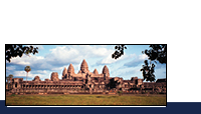It is named after the three headed elephant "Erawan"
of Hindu mythology - the upper level of the park's famous seven
tiered waterfall is said to resemble this creature. Our field
trip however focuses on the one headed elephants that inhabit
the park.
Although well known for its waterfall, the backcountry protion
of Erawan experiences little human traffic. Now part of an innovative
plan to manage the "Western Forest complex" as a whole,
Erawan supports such large mammals as tiger, elephant , gaur
(the world's largest species of wild cattle), sambar deer, barking
deer, serow (a mountain goat), wild boar, bears, and several
primate species. The diversity of other lifeforms is awesome
and each field trip proves unique in terms of what we may encounter.
This trip offers an understanding of the ecology of the Asian
elephant by providing a first hand look at the natural diversity
of areas that elephants use. We also look at the latest techniques
being used to study these massive but secretive animals. Encounters
with wild elephants in Thailand are rare, so although we strive
to maximize the likelihood of a sighting, we also emphasise
the importance of using good "ecological detective work"
to reveal important elements of elephant ecology and behaviour.
Additionally, we explore the history of human - elephant interactions
in Thailand and how current conservation efforts are attempting
to address new pressures on the remaining populations. Information
collected during the course of the trip will become part of
the growing database that provides critical information for
ongoing conservation and management efforts.
Day 1. We will meet you at the door of your
Kanchanaburi hotel at 07.00 AM. After a short drive we start
our journey into the heart of Erawan National Park. Our team
of porters will carry both personal and group gear, leaving
you free to investigate the mysteries of the tropical forest.
En route to our base camp, we will get a look at some of Erawan's
300 or so bird species, and use the mammal sign we find to get
an insider's view of this unique area. After a delicious lunch
prepared by our field cook and served under our spacious field
tent (complete with mosquito net), we will spend the afternoon
getting to know the fauna and flora of one of Erawan's high
ridges, before returning to base camp for a cold drink and a
hot shower. After a relaxing dinner, we will peel back the darkness
using a lighted insect station and headlamps to get a look at
the nocturnal side of life. Overnight at deluxe tented camp.
Walking distance, 5-7 kms.
Day 2. Our wake up call is a hot fresh cup
of coffee or tea (it gets surprisingly chilly at 600m!) delivered
to your tent by our camp staff. As the forest slowly wakes up,
we will be quietly climbing into our nearby tree platform for
a hearty (yet portable) breakfast and a view all the way to
the Burmese border. The platform is a great place to see some
of the resident great hornbills and other canopy birds, and
get a bird's eye view of life in the forest canopy. From here
we will also be able to hear the fascinating and complex calls
of one or more gibbon family groups in the area. Next we trek
deeper into the forest to a pond and wallow used by the elephants
and some of the other resident wildlife. As part of our on-going
elephant monitoring programme, we will take a close look at
elephant activity in this area and record information on track
size (an indicator of the size of individual elephants), feeding
activity, and more. A pack lunch and some time to relax after
a full morning of activity is followed by a leisurely walk out
of the forest to meet the vehicle, which will bring us back
to Kanchanaburi, where we will arrive in the late afternoon.
Walking distance, 6-8 kms.









